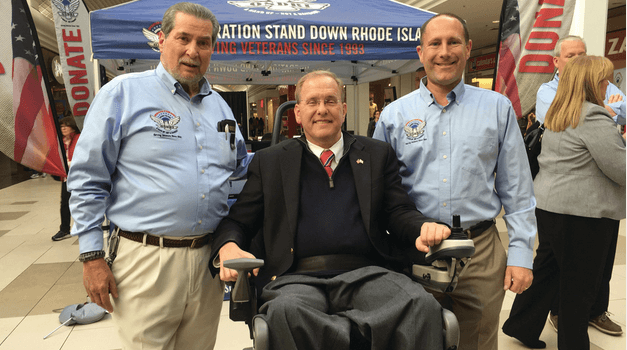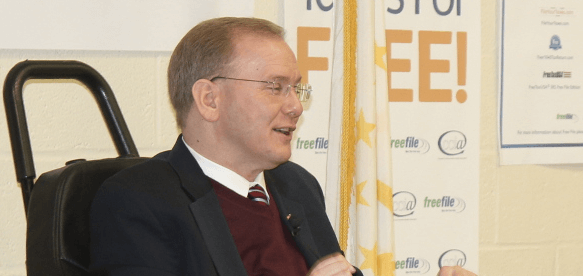Published by Dionne Joseph on November 11, 2016
Washington, Nov 11 – Rhode Island Rep. Jim Langevin, a Democratic member of congress for more than 20 years, won the re-election for Rhode Island’s 2nd congressional district, holding off Republican Rhue Reis.
Langevin completed the #PwDsVote Disability Questionnaire for the presidential, senate and gubernatorial candidates, that was written by RespectAbility, a nonpartisan, nonprofit organization working to end stigmas and advance opportunities for people with disabilities. Reis did not respond to the questionnaire.
“I have made it a hallmark of my work in public service to break down social barriers and educate people about the value that people with disabilities bring to our society,” Langevin responded in the questionnaire. “People with disabilities are our greatest untapped resource, and I will continue fighting for them through efforts that include U.S. ratification of the U.N. Convention on the Rights of Persons with Disabilities to ensure that everyone, not just Americans, is treated with the respect and dignity they deserve.”
Langevin, who acquired a disability prior to the enactment of the Americans with Disabilities Act (ADA), has spoken often about the importance of inclusion of people with disabilities.
“To so many of us, I have to say the ADA has probably altered the paradigm, providing new opportunities and fundamentally changing the way society views and treats us,” he said at an event on the sidelines of the DNC in July. “But as we all know, there is still so much work that lies ahead, because we haven’t even fully realized the vision and the promise of the Act.”
Langevin is a founder and a co-chair of the Bipartisan Disabilities Caucus, an organization where a group of individuals come together and discuss the issues in the people with disability community.
In 2015, he contributed to the FAST Act, a transportation bill that would promote the transit system to make trains more accessible for individuals with disabilities. The bill would allow people with disabilities to gain more opportunities because of the accessible transit system.
Other priorities include having access to community services and supports; removing obstacles to health and wealth; encouraging employment opportunities for people with disabilities; and having a full implementation of the American with Disabilities Act.
“I know there are millions of people with disabilities across the nation who are stuck in their homes when they could be sitting in a classroom, a boardroom, or with me in Congress,” he previously said. “That’s why it is so important that we all take the time to recognize the needs of individuals with disabilities, and the simple ways employers can meet those needs and allow these talented people to achieve the dream of living independently and succeeding in the workplace.”
There are 56 million people with disabilities (one in five Americans), more than 35 million of whom are eligible voters (one-sixth of the electorate). A new poll showed that half of voters either have a disability or a loved one with a disability. The poll also showed that voters were more likely to support candidates who prioritize ensuring that children with disabilities get the education and training they need to succeed as well expanding job and career opportunities for people with disabilities.
RespectAbility reached out to candidates for president, governor and U.S. Senate – requesting them to complete the #PwDsVote disability questionnaire on multiple disability topics ranging from employment, education, violence and abuse, criminal justice, healthcare and more.
Forty down ballot candidates, including 26 for Senate and 11 for governor, from both sides of the aisle (25 Democrats, 14 Republicans, 1 Green Party) responded, showing that disability rights is a nonpartisan issue. The responses also were geographically diverse, coming from states all around the country as politicians are paying more and more attention to the disability community.
View Langevin’s response to the questionnaire below:
QUESTION 1: Do you have designated advisors and clear processes for making decisions on disability issues? If yes, please describe.
ANSWER: Yes. As the first quadriplegic elected to the U.S. House of Representatives, and the uncle of a nephew with autism, I consider these issues a top priority. I am the co-founder and co-chair of the Bipartisan Disabilities Caucus in Congress, which serves as a forum for members and staff to discuss policies and issues of importance to the disability community. I also engage with Federal and state agencies and work regularly with disability advocates on a wide array of disability policies. This work is coordinated through my legislative director and disability policy advisor with the input of my legislative, casework and outreach staff.
QUESTION 2: Is your campaign accessible and inclusive to people with disabilities? If yes, please describe.
ANSWER: Yes, my campaign office is fully accessible, and my website contains key accessibility features. I am also pleased to have volunteers of all races, religions, backgrounds, orientations, and abilities participating in my campaign.
QUESTION 3: Do you have a proven record on improving or a plan to improve the lives of people with disabilities? If yes, please describe.
ANSWER: Yes. Throughout my tenure in Congress, I have worked on numerous policies and proposals to improve the lives of people with disabilities and their families.
In 2006, I authored and championed passage of the Lifespan Respite Care Act to provide respite services to the families of loved ones caring for people with disabilities, and I am continuing to lead the fight for stronger respite care funding 10 years later.
In 2008, I joined my colleagues in the fight to strengthen the Americans with Disabilities Act through passage of the ADA Amendments Act. I also fought for passage of the Christopher and Dana Reeve Paralysis Act of 2009 to enhance research into paralysis and to improve rehabilitation services and quality of life for people living with disabilities.
In 2010, I was proud to support passage of the Patient Protection and Affordable Care Act, which banned annual and lifetime coverage limits, prohibited pre-existing condition exclusions, and expanded Medicaid assistance to empower more people with disabling conditions to obtain insurance coverage and access to care.
In 2014, I was proud to support efforts to pass the Achieving a Better Life Experience (ABLE) Act, to empower people with disabilities to save for legitimate expenses without losing access to critical federal supports, like SSI and Medicaid.
In 2015, I authored an amendment to the FAST Act surface transportation bill that would encourage transit systems across the country to make public transit more accessible and user-friendly for people with disabilities.
Finally, I am proud to support efforts like the Transition to Independence Act and other measures that will assist people with disabilities achieve integrated employment and greater independence and inclusion in their communities, and I will continue the fight to move these priorities forward.
QUESTION 4: Do you have a plan/commitment to reduce the stigmas about people with disabilities that are barriers to employment, independence and equality? If yes, please describe.
ANSWER: Yes. I have made it a hallmark of my work in public service to break down social barriers and educate people about the value that people with disabilities bring to our society. In fact, I believe people with disabilities are our greatest untapped resource, and I will continue fighting for them through efforts that include U.S. ratification of the U.N. Convention on the Rights of Persons with Disabilities to ensure that everyone, not just Americans, is treated with the respect and dignity they deserve.
QUESTION 5: Do you have a proven record on enabling, or a plan to enable, people with disabilities to have jobs, careers and to start their own businesses? Do you have specific strategies for youth employment for people with disabilities and/or sector strategies such as jobs and careers in STEM, hospitality, healthcare and elder care? If yes, please describe.
ANSWER: Yes. As co-chair of both the Bipartisan Disabilities Caucus and the Congressional Career and Technical Education Caucus, I have a unique perspective on the intersection of policies that will provide employment opportunities for people with disabilities across a variety of sectors. I supported passage of the Workforce Innovation and Opportunity Act of 2014, which took some important first steps toward encouraging integrated employment opportunities, and I am currently working to reauthorize the Carl D. Perkins Career and Technical Education Act, with a goal of being even more inclusive of students with disabilities so they can participate in the experiential learning process that is so important in today’s economy. I am also a sponsor of a resolution supporting the inclusion of Art into STEM education, transforming STEM to STEAM for students of all abilities.
QUESTION 6: Do you have a plan to enable students with disabilities, including those from historically marginalized communities and backgrounds, to receive the diagnosis, Individualized Education Plan (IEP) and accommodations/services they need to succeed in school and be prepared for competitive employment? If yes, please describe.
ANSWER: Yes. I support stronger funding of IDEA Part B grants to states to realize more fully the potential of students with disabilities in schools. I also support early childhood education programs and stronger resources for school counselors and other education and health professionals.
QUESTION 7: Do you have a plan to reform the benefits system (Medicaid, Medicaid buyin) to enable people with disabilities to work to the best of their capacities without losing supports they need to work? If yes, please describe.
ANSWER: Yes. I am a cosponsor of the Transition to Independence Act, which would incentivize more integrated employment opportunities, including a Medicaid Buy-In program that would allow people who require Long-Term Care Services to work without fear of losing these critical supports that make them more self-sufficient.I also supported passage of the Achieving a Better Life Experience (ABLE) Act of 2014 to empower people with disabilities to save for legitimate expenses without losing access to critical federal supports, like SSI and Medicaid. And I am a cosponsor of a package of bills that would strengthen the ABLE Act even further, including the ABLE to Work Act, the ABLE Financial Planning Act and the ABLE Age Adjustment Act.
QUESTION 8: Do you have a plan to ensure people with disabilities are eligible for affordable health insurance regardless of preexisting conditions? If yes, please describe.
ANSWER: Yes. I proudly supported passage of the Affordable Care Act, which expanded affordable coverage to 20 million previously uninsured people in the United States. Although this was an important first step, more must be done to ensure that people don’t fall through the cracks as they work to determine the best coverage options for them, including critical long-term care coverage that is still sorely lacking in the private market. Although I was disappointed that the CLASS provision in health reform couldn’t be implemented, I believe we must continue working towards a robust LTC insurance option for all.
QUESTION 9: Do you have a plan to provide home and community-based services to people with disabilities who would rather live in their own homes instead of institutions, and have the community attendant supports they need to work? If yes, please describe.
ANSWER: Yes. I am an original cosponsor of the Disability Community Act, which would provide a temporary increase in Medicaid reimbursements for the community providers of services and supports as they come into compliance with federal overtime and minimum wage standards for PCAs. I am also the primary sponsor of a bill to reauthorize the Lifespan Respite Care Act, which would continue building coordinated respite care service networks for family caregivers who provided $470 billion in uncompensated care in 2013, more than state and federal Medicaid payments combined.
QUESTION 10: Do you have a plan to ensure that individuals with disabilities receive services that would prevent them from being swept up into the criminal justice system, divert individuals with disabilities who are arrested to treatment options in lieu of jail where appropriate, receive needed accommodations in the criminal justice process and while incarcerated, and offer appropriate reentry support to help individuals with disabilities leaving jails and prisons reintegrate into their communities and secure jobs? If yes, please describe.
ANSWER: People with disabilities – and juveniles in particular — experience disproportionately higher incarceration rates. We must take meaningful actions in any criminal justice reform measure to keep non-violent, disabled juveniles out of the juvenile justice system in the first place, reducing their exposure to additional violence and decreasing recidivism rates later in life. This involves providing the proper community-based, educational, behavioral and mental health resources to address underlying issues before they become a problem. It also requires engaging law enforcement and other community partners in education campaigns that include sensitivity training, de-escalation strategies, crisis management, and other tools that will result in more positive outcomes.
QUESTION 11: People with disabilities are twice as likely to be victims of crime as those without disabilities. People with disabilities also are far more likely to suffer from police violence, partially because manifestations of disability can be misunderstood as defiant behavior. Do you have a plan to address these issues? If yes, please describe.
ANSWER: Congress must provide more resources to train teachers, case workers, police officers and others to utilize positive methods of interaction that include de-escalation strategies, crisis management, positive behavioral interventions, and additional strategies that will decrease the incidence of negative and disruptive social interactions.
QUESTION 12: Both children and adults with disabilities are more likely to be victims of rape or sexual assault. Do you have a plan to address this issue? If yes, please describe.
ANSWER: The horrifying reality is that sexual abuse against people with disabilities is all too prevalent and must be stopped. I have been a strong advocate of strengthening laws such as the Violence Against Women Act and the Family Violence Prevention and Services Act to address instances of domestic violence and sexual assault in all forms. And while these programs do assist victims with disabilities, much more can and must be done to ensure no barriers exist to receiving the services and supports that victims need, regardless of their abilities or disabilities.
QUESTION 13: Do you have a plan for veterans with disabilities facing barriers transitioning from active duty to civilian employment? If yes, please describe.
ANSWER: I strongly support the Work Opportunity Tax Credit, which makes tax credits available to employers for hiring individuals who have consistently faced significant barriers to employment, including veterans. I am also proud to be the lead cosponsor of the Military and Veterans Caregiver Services Improvement Act, which would improve military caregiver services by making veterans of all eras eligible for caregiver support services; extending eligibility to include a wider array of needs that may require caregiving; and expanding services available to caregivers, such as child care, financial advice and legal counseling. It would also allow veterans in the VA caregiver program to transfer Post-9/11 GI Bill benefits to their dependents in recognition of the fact that a spouse, who may have been unemployed or underemployed previously, may now be required to become the primary source of income for the family.
QUESTION 14: Do you have a plan for accessible, affordable, integrated housing to allow people with disabilities to live in the communities where they work or are seeking work? If yes, please describe.
ANSWER: Yes. I introduced the Veterans Homebuyer Accessibility Act, which would provide an $8,000 tax credit for veterans to purchase their first home, and an additional $8,000 tax credit for adaptive housing modifications. This legislation will make it easier for our disabled veterans, who have served with distinction, to purchase a new home and make necessary adaptive modifications. I also strongly support funding for Section 8 housing, as well as Section 202 and 811 supportive housing for the elderly and disabled.
QUESTION 15: Do you have a plan to address the lack of accessible transportation options that is a barrier to work for people with disabilities? If yes, please describe.
ANSWER: Yes. I was pleased to incorporate an amendment, adapted from my Transit Accessibility Innovation Act, into the surface transportation law encouraging transit systems to make public transportation more accessible and user-friendly for individuals with disabilities. This amendment increased the threshold of FTA funding that can go to paratransit services from 10 to 20 percent if the transit system is able to address accessibility deficiencies and improve service in compliance with the Americans with Disabilities Act, including qualifying for eligibility, telephone hold times, on-time performance, no-show policies, and origin-to-destination services.
QUESTION 16: Do you have a plan to advance innovations (i.e., assistive technologies, devices) that can help people with disabilities become more successfully employed, productive and independent? If yes, please describe.
ANSWER: Yes, I have advocated for strong Assistive Technology Act Program (ATAP) funding over the years, and I have hosted briefings as co-chair of the Bipartisan Disabilities Caucus on assistive technologies that can provide people with disabilities more inclusion and independence at home and in the workplace.
The RespectAbility Report is a nonpartisan political commentary on the 2016 U.S. elections with a focus on disability issues. The RespectAbility Report has covered all of the Democratic and Republican candidates for president, senate and governor. Coverage can be found at http://therespectabilityreport.org/. The RespectAbility Report is nonpartisan and does not endorse candidates.













